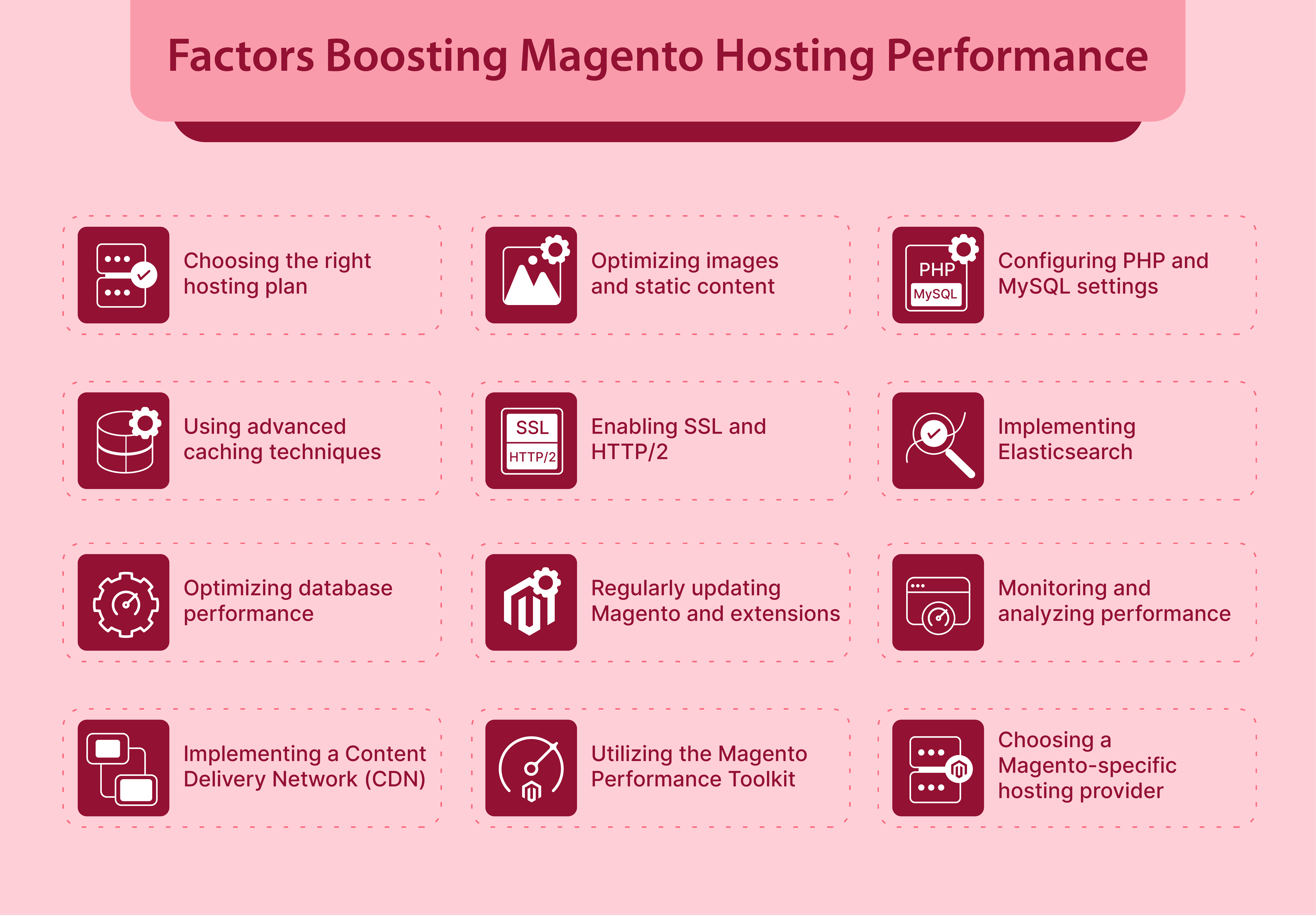
Fastest Magento Hosting in 2025: Key Factors and Best Strategies
Are you looking for the fastest Magento hosting for your online store? These hosting plans are designed to enhance your store’s performance. They help ensure quick load times and a smooth user experience.
This article explores top hosting options, features, & tips for selecting the right provider.
Key Takeaways
- 10 steps to start a new Magento store or upgrade an existing one.
- Insights into choosing managed Magento hosting for expert support and maintenance.
- Specialized hosting solutions customized for Magento stores.
- Hosting environments are optimized to handle Magento’s unique needs.
- Speed, scalability, and expert support.
- Managed hosting plans with SSD storage, CDN, and optimized server settings.
- 6 tips to help users of all levels select and optimize their Magento hosting solution.
-
Why Does Fast Magento Hosting Matter for E-commerce Success?
-
Top Features of High-Performing Magento Web Hosting Solutions
-
Cost vs. Performance: Investing in the Fastest and Best Magento Hosting
-
10 Steps to Migrate to a Faster Magento Server Hosting Platform
-
Security Considerations for a Fast and Fully Managed Magento Hosting Experience
-
Technical Requirements for Optimized Magento Web Hosting Providers
-
Managed Magento Hosting Plan: Fast and Scalable Magento Platform Infrastructure
-
Best Practices for Maximizing Performance in Premium Magento Hosting Plans
Why Does Fast Magento Hosting Matter for E-commerce Success?
Magento hosting offers server resources and environments optimized for Magento sites.
Fast Magento hosting is necessary for e-commerce success because speed affects user experience. A Google study shows that 53% of mobile users abandon sites that load over three seconds. If your store has slow loading times, customers may leave before seeing your products.
For example, if you’re running a promotional campaign during peak shopping seasons, a fast hosting solution ensures your site can handle increased traffic without crashing. This reliability not only keeps customers engaged but also boosts conversion rates. Users are more likely to complete a purchase when they have a smooth shopping experience.
With expert services, your online store will operate efficiently and securely. They will also help you manage data, traffic, and transactions smoothly.
Choosing the right Magento hosting enhances your site's speed and reliability. It positively influences traffic and sales. Advanced hosting solutions ensure rapid load times, keeping visitors engaged & reducing bounce rates. Superior server-side performance delivers a fast, smooth on-site experience. It improves your Magento website’s speed and navigation.
Comparing Top Magento Hosting Providers for Speed
| Hosting Provider | Speed Features | Performance Features | Unique Offerings |
|---|---|---|---|
| MGT-Commerce | Sub-0.3 second page loads | AWS-powered, scalable solutions | Free migration, 24/7 support |
| Host Duplex | SSD storage, LiteSpeed Cache | Auto-scaling, 99.95% uptime guarantee | Eco-friendly hosting with renewable energy credits |
| Cloudways | SSD storage, Varnish Cache | Auto-scaling, 99.99% uptime | Free migration, SSL certificates |
| IONOS | SSD storage, HTTP/2 protocol | Auto-scaling, 99.9% uptime | Free SSL certificates, daily backups |
| InMotion Hosting | NVMe SSD storage, advanced caching | UltraStack Technology, 99.99% uptime | 90-day money-back guarantee |
| ScalaHosting | SSD storage, caching technologies | 99.9% uptime guarantee | SPanel control panel, daily backups |
| FastComet | SSD storage, Cloudflare CDN | NVMe SSDs, 99.9% uptime | Free domain transfer |
Top Features of High-Performing Magento Web Hosting Solutions
1. Performance and Speed

i. Fast Servers Optimized for Magento
Ensure your hosting provider uses servers specifically configured to handle Magento's demands. It will lead to faster load times and better user experiences.
ii. Use of SSD Storage
Solid-state Drives (SSDs) provide quicker data access than traditional hard drives. It means that your Magento site will load faster and keep customers satisfied.
iii. Built-in CDN
A Content Delivery Network (CDN) caches your website content across multiple global servers. When a user visits your site, the CDN serves the content from the server closest to them, reducing load times. This approach significantly improves content delivery, particularly for international customers.
Suppose customers in Europe & North America access your store hosted in Asia without a CDN. In that case, they will experience slower load times due to the distance data must travel. With a CDN in place, users in Europe would retrieve content from a nearby server in their region. It would lead to faster access and improved user experience.
2. Security Features

i. Free SSL Certificate
An SSL certificate encrypts sensitive data during transactions. It ensures secure payments on your Magento site.
ii. Advanced Firewall Protection
Protect your store from malicious attacks. Implement solid firewall systems that filter out harmful traffic.
iii. Regular Malware Scanning
Your hosting provider should offer regular scans. It lets you detect and eliminate malware threats, keeping your store safe.
3. Scalability

i. Support for Traffic Spikes
Your Magento store may experience sudden traffic surges during promotions or seasonal sales. Choose a hosting provider that can handle these spikes without crashing.
ii. Easy Upgrades for Resources
Look for a hosting service that allows you to allocate resources like RAM and storage as needed. It will ensure that your site remains almost even as demand increases.
4. Customer Support

i. 24/7 Assistance from Magento Experts
Choose a hosting provider that offers round-the-clock support from professionals who understand Magento. It ensures quick resolutions to any issues you encounter.
For instance, if your checkout process fails during peak shopping hours due to server overload and you cannot reach support quickly, this could lead to significant revenue loss as customers abandon their carts. A responsive support team familiar with Magento can troubleshoot issues efficiently & minimize downtime.
ii. Support for Troubleshooting and Updates
Regular updates are necessary for security and performance. Your hosting provider should assist with troubleshooting any problems related to updates/configurations.
Cost vs. Performance: Investing in the Fastest and Best Magento Hosting
| Hosting Provider | Plan Type | Starting Price (Monthly) | Key Features | Performance Rating |
|---|---|---|---|---|
| MGT-Commerce | Managed Hosting | $153.51 + AWS cost | Sub-0.3s load time, 24/7 support, free migration | Excellent |
| A2 Hosting | Shared (Turbo Boost) | $6.99 | Unlimited SSD, free site migration, Turbo servers | 20x faster |
| Hostinger | Cloud Hosting | $8.09 | Free SSL, daily backups, LiteSpeed server | Almost |
| Nexcess | Managed Cloud Hosting | $37.20 | Auto-scaling, built-in CDN, daily backups | High |
| InMotion Hosting | VPS Hosting | $29.99 | SSD storage, advanced caching, 90-day money-back | Solid |
| Bluehost | Shared Hosting | $2.95 | Free domain, unmetered bandwidth, 24/7 support | Good |
| Cloudways | Pay-as-you-Go | $10 | Flexible pricing, multiple cloud providers | Variable |
Speed Optimization Techniques for Reliable Magento Hosting

1. Server Optimization Tips
i. Use Caching Solutions
Implement caching solutions like Varnish Cache or Redis. These tools store frequently accessed data in memory, drastically reducing time.
ii. Enable Gzip Compression
This technique compresses files before sending them from the server to the browser. It can reduce file sizes by up to 70-90%, leading to faster load times and improved SEO.
2. Database Optimization
i. Regularly Clean Up Unused Data
Remove any unnecessary entries from your database, such as old logs/expired sessions. A clean database runs faster and more efficiently.
ii. Optimize Database Queries
Review and optimize your database queries regularly to ensure they return results quickly. It can significantly improve overall performance.
3. Backup Solutions
i. Schedule Automatic Backups for Magento
Regular backups ensure you can quickly restore your site if something goes wrong. These backups are designed to function without affecting site performance.
ii. Use Cloud Storage for Backup Redundancy
Storing backups in the cloud provides extra security & ensures quick access when needed. It can help maintain site speed during recovery processes.
4. Other Techniques to Enhance Speed
i. Implement a Content Delivery Network (CDN)
A CDN distributes your content across multiple servers worldwide. It ensures that users access data from the nearest server. Thus, it reduces latency and improves load times.
ii. Minimize HTTP Requests
Reduce the number of elements on your pages to decrease loading times. Fewer requests mean faster page loads.
iii. Optimize Images and Media Files
Make sure images are compressed and optimized for web use. It reduces their file size without sacrificing quality, leading to quicker load times.
10 Steps to Migrate to a Faster Magento Server Hosting Platform
Step 1: Choose the Right Host
Look for hosting providers specializing in Magento 2 hosting. Key factors include:
- Magento 2 compatibility
- Scalability
- Support
- Reviews from businesses with similar needs
Ensure the host provides features like PHP 7.4+, Elasticsearch, & Varnish Cache support.
Step 2: Backup Everything
Use Magento 2’s native backup features to create backups of your:
- Database
- Media files
- Codebase
Using a hosting provider like MGT Cloud, use tools like the Control Panel to automate backups. Test restoration to confirm the integrity of backups.
Step 3: Set Up the New Hosting Environment
- Prepare your new hosting environment according to Magento 2 requirements.
- Install the correct Magento 2 version.
- Configure PHP settings, file permissions, and MySQL databases.
- Set up services like Redis and Elasticsearch for optimal performance.
Step 4: Test the New Host
Clone your Magento 2 site and deploy it on the new host’s staging environment. Test functionality, performance, and compatibility of themes, extensions, and customizations. Resolve issues before proceeding to live migration.
Step 5: Transfer Files and Data
- Use SSH for secure and fast file transfers.
- Migrate your Magento 2 installation files, including themes, extensions, and custom configurations.
- Export & import your database using Magento 2-compatible tools like phpMyAdmin or command-line utilities. Ensure that data integrity is maintained.
Step 6: Update Configurations
- Modify the
app/etc/env.phpfile to reflect the new database credentials and paths. - Reindex Magento 2 data by running the reindex command to ensure proper functionality.
- Clear the Magento cache using CLI commands to avoid configuration conflicts.
Step 7: Update Your Domain
Update DNS records to point to the new server. For Magento 2, verify the base URLs in the database to ensure proper routing. Perform this step during off-peak hours, as DNS propagation can take up to 48 hours.
Step 8: Thorough Testing
Test all sensitive functions of your Magento 2 site, including:
- Page load speed and responsiveness
- Payment gateways and checkout processes
- Mobile and cross-browser compatibility
Use tools like Magento 2 Profiler to identify and resolve performance bottlenecks.
Step 9: Go Live
- Migrate the staging environment to live with minimal downtime.
- Use "301 redirects" to maintain SEO rankings for URLs.
- Run a final round of testing to confirm the live site operates smoothly.
Step 10: Monitor and Optimize
- Monitor performance metrics like server response time, page speed, and error logs.
- Use tools like Magento 2 Performance Toolkit for ongoing optimization.
- Gather customer feedback and adjust as needed to enhance the user experience.
Security Considerations for a Fast and Fully Managed Magento Hosting Experience
| Security Consideration | Description | Benefits |
|---|---|---|
| Data Encryption | Use strong encryption protocols (AES-256) to protect sensitive customer data. | Prevents unauthorized access and data breaches |
| Regular Software Updates | Keep Magento and all extensions updated to the latest versions. | Protects against known vulnerabilities and enhances security |
| Web Application Firewall (WAF) | Deploy a WAF to monitor incoming traffic and block malicious requests. | Shields against SQL injection, XSS, and DDoS attacks. |
| Strong Password Policies | Implement complex password requirements and change them every "90 days". | Reduces the risk of unauthorized access |
| Two-factor Authentication (2FA) | Require an extra verification step for admin logins. | Adds an extra layer of protection against unauthorized access |
| IP whitelisting | Restrict admin access to specific IP addresses to prevent unauthorized logins. | Limits exposure to potential attacks from untrusted locations |
| Regular Backups | Schedule automatic backups to ensure data recovery in case of a breach or failure. | Protects against data loss and ensures business continuity |
| Secure Payment Gateways | Use reputable payment gateways that comply with PCI DSS standards for secure transactions. | Ensures customer payment information is handled securely |
| Monitoring and Auditing | Regularly review logs and use monitoring tools to detect unusual activity or breaches. | Enables quick response to potential security incidents |
6 Tips to Choose the Fastest Magento Hosting Provider
1. Reputation
Choose a hosting provider with a strong industry reputation. Evaluate their:
- Years in business
- History of delivering quality services
- Any awards or recognitions in the hosting field
A well-established provider is more likely to offer reliable and efficient hosting solutions.
2. Support
Reliable customer support is necessary to resolve technical issues quickly. Look for hosting providers offering multiple support channels, such as:
- Live chat
- Phone support
Preferably, choose providers with 24/7 availability. Read reviews or try their support services. It allows you to assess the responsiveness and expertise of their team.
3. Reliability
Ensure the hosting provider guarantees high uptime, ideally 99.9% or more. It allows you to keep your Magento website accessible. Check their historical uptime records and look for features like:
- Redundant infrastructure
- Automated backups
- Proactive monitoring systems
These measures reduce downtime and ensure smooth operations.
4. Speed
Speed is vital for a smooth user experience and better SEO rankings. Evaluate the provider's infrastructure, such as:
- Modern server hardware
- SSD storage
- HTTP/2 support
Look for features like built-in caching & content delivery networks to reduce load times. Test server response times and page speed metrics to ensure optimal performance.
5. Reviews and Ratings
Research customer reviews on Trustpilot, HostAdvice, and Google Business Reviews. Focus on feedback about speed, reliability, customer support, and pricing. Compare hosting plans for value and affordability while considering the quality of service. Real user experiences can help you make informed decisions.
6. Security
Security should be a top priority when selecting a hosting provider. Look for strong measures like:
- Free SSL certificates
- Firewalls
- DDoS protection
- Regular security updates
Evaluate their data protection policies and track record in handling cyber threats. A secure hosting environment safeguards your Magento site and builds customer trust.
Technical Requirements for Optimized Magento Web Hosting Providers
| Technical Requirement | Description | Benefits |
|---|---|---|
| Operating System | Must run on a Linux-based OS (e.g., Cent OS or Ubuntu). | Compatibility with Magento and better performance |
| Web Server | Use Apache 2.4 or Nginx 1.x for optimal performance. | Efficient handling of requests and improved speech |
| Database Management | Support for MySQL 5.7 or MariaDB 10.4 is required. | Enhanced data handling and faster query responses |
| PHP Version | PHP 7.4 or later is necessary to ensure compatibility and performance. | Improved speed and security features |
| Memory Requirements | A minimum of 2GB RAM is recommended; 4 GB or more is preferred for high-traffic storage. | Smooth operation during peak times and better user experience |
| SSD Storage | Solid State Drives should be used instead of traditional HDDs. | Faster data retrieval and improved loading times. |
| Caching Solutions | Implement solutions like Varnish, Redis, or OPcache to enhance speed. | Reduces load times and impacts overall site performance |
| Security Features | Ensure strong security measures like SSL certificates and firewalls are in place. | Protects sensitive customer data and enhances trust |
| Regular Backups | Automatic backups should be scheduled to safeguard data against loss. | Ensures quick recovery in case of issues or data loss |
| Compliance with Magento Requirements | Ensure the hosting meets all specific system requirements outlined by Magento documentation. | Guarantees optimal functionality and performance of the store |
Managed Magento Hosting Plan: Fast and Scalable Magento Platform Infrastructure
1. Optimized Performance
Managed hosting providers to fine-tune server configurations specifically for Magento. It includes optimized PHP versions and server-level caching. They ensure your site runs at peak performance.
The use of Content Delivery Networks (CDNs) enhances global access speeds. It also speeds up websites for users worldwide.
2. Scalability
A managed plan allows you to scale resources such as CPU, memory, and storage based on your traffic needs. It also ensures that your Magento performance is not compromised.
Smooth upgrades to more advanced plans are available without downtime. They help you support your business growth effortlessly.
For example, cloud hosting solutions often provide auto-scaling features. These automatically allocate extra resources during traffic spikes. It allows hosting to scale resources to handle the surge in traffic on Black Friday. This capability helps you handle increased load efficiently without compromising performance.
3. Enhanced Security
Security is a top priority for e-commerce sites. Managed hosting typically includes strong security measures such as:
- Firewalls
- Malware scanning
- Intrusion detection systems
Free SSL certificates are commonly provided, ensuring secure transactions and protecting customer data. Regular software updates are automated, keeping your Magento installation secure against vulnerabilities.
4. Expert Support
With a managed hosting plan, you have access to a dedicated support team. This team understands the complexities of the Magento software. They are available 24/7 to assist with any issues. They help ensure quick resolutions and minimal downtime. Their expertise lets you focus on business, not technical issues.
5. Automatic Backups
Regular automatic backups are a must for data protection. Managed hosting solutions often include this feature. It allows for quick recovery in case of data loss or corruption. This peace of mind enables you to operate confidently, knowing that data is safe.
Best Practices for Maximizing Performance in Premium Magento Hosting Plans
| Best Practice | Description | Benefits |
|---|---|---|
| Choose a Magento Specialized Provider | Select hosting services that cater specifically to Magento. | Optimized performance, better support, and customized solutions |
| Enable Full-Page Caching | Leverage caching technologies like Varnish or Redis to cache full pages. | Faster load times and reduced server load |
| Implement a Content Delivery Network (CDN) | Distribute static content globally to reduce latency. | Improved load times for international users |
| Regularly Update Software | Keep Magento extensions updated to the latest versions. | Enhanced security, improved speed, and new features |
| Monitor Resource Usage | Track server resources using monitoring tools to spot potential issues early. | Proactive management of performance bottlenecks. |
| Optimize Database Management | Regularly clean up and optimize your database for quicker access times. | Reduced loading times and improved overall site speed |
| Enable Gzip Compression | Compress files before sending them to users' browsers. | Significant reduction in load times, improved SEO rankings |
| Use SSD Storage | Opt for Solid State Drives instead of traditional HDDs for faster data access. | Faster loading speeds, better user experience |
| Implement Lazy Loading | Load images only when they are visible on the screen. | Reduced initial load time and bandwidth usage |
| Activate Production Mode | Ensure Magento runs in production mode for optimal speed & efficiency during high traffic. | Better handling of high visitor volumes without lagging |
Emerging Trends Shaping Your Magento Hosting Account
1. AI Integration
AI technologies transform Magento hosting setups. They automate routine tasks, enhance security, and predict traffic spikes, enabling optimized scalability. AI-driven threat detection neutralizes potential risks before they impact operations.
AI also optimizes caching strategies based on user behavior. It significantly reduces page load times and enhances the overall user experience.
2. Magento Headless Architecture
Magento headless architecture redefines hosting flexibility. Businesses can leverage diverse front-end technologies by decoupling the front and back ends. This architecture supports personalized Progressive Web Apps (PWAs) and efficient cross-channel experiences. It simplifies content delivery across platforms and devices. It also allows easy integration of emerging tools & services, enabling customized customer journeys.
3. Decentralized Hosting
Decentralized hosting is a resilient alternative to traditional models. It distributes hosting across multiple nodes. Thus, it minimizes risks like DDoS attacks and server failures. This setup eliminates single points of failure, ensuring consistent uptime for Magento stores.
Decentralized systems reduce latency by delivering content closer to users. They enhance engagement and improve overall performance.
4. Edge Computing
Edge computing revolutionizes data processing and delivery. Bringing computation closer to the user reduces latency and boosts site speed. It is especially impactful for dynamic content and real-time interactions. With platforms like AWS Edge, Magento stores can offer faster browsing experiences. They can meet modern shoppers’ expectations for speed & efficiency while improving site performance.
Common Speed Issues with the Best Magento Hosting Providers
| Speed Issue | Description | Potential Fixes |
|---|---|---|
| Slow Page Load Times | Pages take too long to load, frustrating users. | Optimize images, enable Gzip compression, and use a CDN. |
| High Abandonment Rates | Customers leave before completing purchases due to slow checkout processes. | Improve server response time and optimize checkout flow. |
| Server Resource Limitations | Insufficient CPU/RAM leads to slow performance during high traffic. | Upgrade the hosting plan or switch to a dedicated server. |
| Caching Problems | Misconfigured caching leads to longer load times and higher server load. | Ensure caching is enabled and configured correctly (e.g., Varnish, Redis). |
| Poor Database Performance | Inefficient database queries slow down page generation. | Regularly optimize the database and clean up unused data. |
| Excessive HTTP Requests | Too many elements on a page increase loading times. | Minimize the number of elements and combine CSS/JS files. |
| Outdated Software | Running an old version of Magento can hinder performance. | Always update to the latest Magento version. |
| Unoptimized Themes/Extensions | Heavy themes or poorly coded extensions can slow down the site significantly. | Audit and remove unnecessary extensions; choose lightweight themes. |
FAQs
1. What are the benefits of dedicated hosting for Magento?
Dedicated hosting offers exclusive server resources for your Magento application. It provides better performance, security, and scalability. Businesses with high traffic can benefit from a dedicated hosting plan. It ensures your Magento store operates efficiently under heavy workloads.
2. How can Magento cloud hosting plans help businesses scale?
Magento cloud hosting plans allow resource scaling during traffic spikes. These plans include performance-focused Magento cloud hosting features. They are designed to support Magento's growth effectively. Top cloud providers, like Amazon Web Services, offer reliable hosting environments.
3. Why is a shared hosting plan not ideal for Magento?
A shared hosting plan provides limited resources for Magento applications. It lacks the scalability needed for high-traffic Magento stores. Shared hosting plans also affect performance and security levels. Businesses seeking fast and secure hosting should consider alternatives.
4. What makes managed Magento cloud hosting a better option?
Managed Magento cloud hosting offers enhanced performance and expert support. These web hosting services for Magento include optimized server configurations and maintenance. They provide hosting for better security and scalability without manual effort. Magento experts also provide support to ensure smooth operations.
5. How do you evaluate the hosting needs of your Magento store?
Evaluate the hosting based on traffic, storage, and scalability needs. Use hosting plans designed to handle Magento-specific requirements. Managed plans and cloud hosting for better reliability work well. Make sure your Magento hosting provider supports upgrades smoothly.
6. What role does Amazon Web Services play in Magento hosting?
Amazon Web Services powers some of the best hosting providers. It offers fast, secure hosting with high uptime guarantees. AWS supports hosted Magento applications with scalable and efficient solutions. Its infrastructure meets the hosting industry's standards.
7. What should you look for in the best hosting provider?
Look for providers offering performance-focused Magento cloud hosting solutions. They should support Magento-specific needs and scalability requirements. The best hosting provider includes features like managed Magento cloud support. Hosting plans should ensure your Magento store remains efficient.
Summary
The fastest Magento hosting ensures optimized speed, reliability, & security for any Magento store. It allows businesses to:
- Ensure better performance for their store.
- Boost their store’s performance and deliver security, speed, and scalability.
- Optimize their hosting environment with caching, backups, and database improvements for smooth operations.
- Handle server maintenance, security updates, and performance optimization.
- Offer scalability, reliability, & flexibility with Cloud hosting, making it ideal for growing stores.
- Ensure fast loading speeds, secure operations, and smooth functionality for their Magento store.
- Secure their store & build customer trust during transactions with a free SSL certificate.
Ensure fast, secure, and scalable eCommerce operations with the fastest Magento hosting services.




